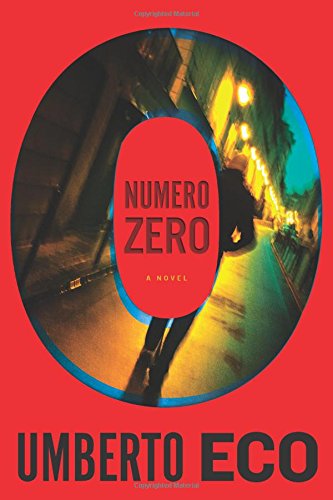
Numero Zero
کتاب های مرتبط
- اطلاعات
- نقد و بررسی
- دیدگاه کاربران
نقد و بررسی

August 10, 2015
At the heart of Eco’s short, satiric novel beats a rant against contemporary journalism and the suspicion-rich, fact-poor culture it nurtures. In 1992, Colonna—a 50ish university dropout who ekes out a living as a hack journalist/manuscript reviewer/proofreader/fact-checker—is hired by Milan editor Simei to help produce sample issues of a proposed (mock) newspaper underwritten by an ambitious hotel and nursing home magnate for his private use. Colonna’s new job includes ghostwriting Simei’s book about the newspaper experiment, for his own purposes. At editorial meetings, the newspaper’s six reporters are taught such journalistic techniques as dumbing down, grouping stories to suggest worrisome themes, responding to complaints by casting aspersions on the complainer, quoting sources real and imaginary, and slanting news while maintaining an objective posture. As the newspaper takes shape, Colonna becomes romantically involved with Maia, the horoscope writer, and befriends Bragadaccio. Formerly a magazine freelancer for What They Don’t Tell Us, Bragadaccio is obsessed with the idea that Mussolini is alive, well, and living in Argentina, with the coverup connecting the CIA, a right-wing/Catholic conspiracy, and sundry government scandals. For Eco (The Prague Cemetery), 20th-century history is a mud river beneath Italian society, creating sinkholes for truth and principle. Historical fiction still inspires his best writing, but while romance and humor have never been his forte, they are both credible here. Unfortunately, the promise of a psychological/political thriller remains unfulfilled. As fact and fiction merge into mystery, Eco offers fewer clues than in his masterwork, The Name of the Rose, but no William of Baskerville to solve the puzzle.

November 1, 2015
In this short, sharp, satiric novel by Italian philosopher, educator, and author Eco (The Name of the Rose; Foucault's Pendulum), failed novelist Colonna is hired by a shady businessman and his lackey to ghostwrite a book about the establishment of a newspaper that may never see the light of day. Domani, as its name suggests, will not be printing yesterday's news. It will create tomorrow's news, and Colonna will oversee the small cadre of contributing reporters. There's the intense Maia Fresia, a former gossip columnist hoping to write literary pieces, and the aptly named Braggadocio, assigned to investigate prostitution but secretly following a conspiracy theory surrounding the death of Benito Mussolini. In ironically funny editorial meetings, each idealistic writer proposes brilliant story lines that are shot down in favor of simplistic pieces that will appeal to the masses. Any real news is repudiated in favor of the most lurid story of the moment, while the man pulling the strings, the owner of a TV empire and a swath of hotels, could halt the flow of money at any time. VERDICT Eco, an acknowledged expert on media culture and the nature of communication, uses biting humor, a dollop of romance, and a hint of mystery to address the timely, thought-provoking prospect of an increasingly uninformed public. [See Prepub Alert, 5/17/15.]--Sally Bissell, formerly with Lee Cty. Lib. Syst., Fort Myers, FL
Copyright 2015 Library Journal, LLC Used with permission.

























دیدگاه کاربران